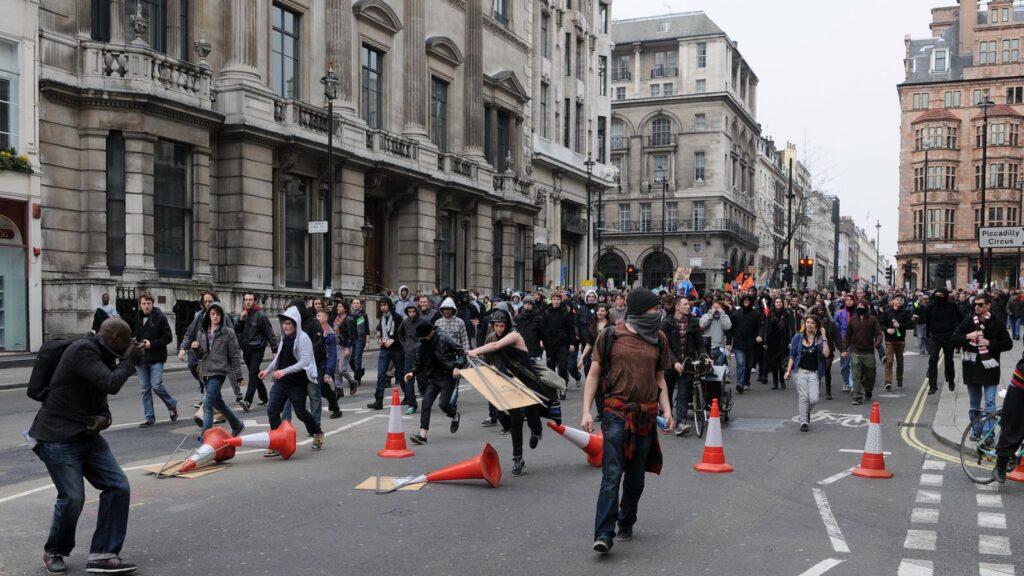The UK is often seen as a safe and secure place to live and visit, with its historic landmarks, charming countryside, and big cities. However, there are several reasons why the UK might not be as safe as you think, so let’s delve into 21 reasons why the UK’s safety might be more complex than it appears.
Rising Crime Rates

“Most people believe we are becoming a more dangerous society,” says The Times. In recent years, the UK has seen an uptick in crime rates, particularly in urban areas, and this includes a range of offences such as burglary and assault. While the overall crime rate is still lower compared to some countries, the increase in certain types of crime can make certain areas feel less safe.
Knife Crime Epidemic

Knife crime has become a significant issue in the UK, particularly in cities like London. Young people are often involved, and the violence has led to tragic consequences, with the reasons behind this surge being complex, involving social, economic, and cultural factors.
Cybercrime Threats

As Great Britain becomes more digital, cybercrime is on the rise. This includes hacking, identity theft, and online scams. Individuals and businesses alike are targets, with significant financial and personal information at risk. The increasing sophistication of cybercriminals means that the threat remains substantial even with robust security measures.
Terrorism Concerns

The UK has been a target for terrorism over the years, with several high-profile attacks occurring in recent memory. These incidents, although relatively rare, have had significant impacts on public perception of safety, and the threat level varies but remains a constant consideration for both residents and visitors.
Public Health Issues

Public health has become a major concern, especially highlighted by the COVID-19 pandemic. Beyond pandemics, issues such as antibiotic resistance and lifestyle-related diseases also pose risks. The strain on the NHS and public health services can sometimes lead to delays and gaps in healthcare provision.
Environmental Hazards

Environmental hazards, including flooding and pollution, pose significant risks in the country. Flooding has become more frequent due to climate change, affecting homes and infrastructure. Air pollution, particularly in cities, poses health risks, contributing to respiratory problems and other conditions.
Drug Abuse Problems

Drug abuse remains a persistent issue in the UK, affecting individuals and communities. Furthermore, the use of substances like cocaine and heroin has led to increased health problems and crime. Efforts to combat drug abuse include both law enforcement and public health approaches, but the problem persists.
Homelessness and Rough Sleeping

Homelessness is a visible and troubling issue in many cities. Rough sleepers are vulnerable to violence, health issues, and exploitation. The presence of homelessness also reflects broader social and economic challenges, including housing affordability and mental health services.
Domestic Violence

Remaining a critical problem with many cases going unreported, domestic violence was exacerbated by the lockdowns during the COVID-19 pandemic, as victims were often trapped with their abusers. Despite various support services and legal protections, the prevalence of domestic violence highlights significant safety concerns.
Mental Health Crisis

Mental health issues are increasingly recognised but still pose a major challenge in the UK. The stigma around mental health and the availability of services are ongoing concerns, and mental health problems can lead to self-harm, suicide, and other safety issues.
Traffic Accidents

A common occurrence and a significant safety concern in England, traffic accidents can be caused by busy roads, distracted driving, and poor weather conditions, which contribute to the risk. Despite various road safety campaigns and measures, the number of accidents remains high, impacting pedestrians, cyclists, and drivers alike.
Violent Protests and Public Disorder

The UK has seen a rise in public protests, some of which have turned violent. Issues ranging from political decisions to social justice have sparked large gatherings, sometimes leading to clashes with police and public disorder, and such events can cause significant disruption.
Fire Safety Issues

Fire safety, particularly in residential buildings, has been a major concern following the Grenfell Tower disaster. Issues with building regulations, cladding, and fire safety measures have come to light, highlighting risks in both public and private housing. Making sure that all buildings meet safety standards is an ongoing challenge.
Natural Disasters

While the UK is not as prone to natural disasters as some other countries, it is not immune. Severe weather events, such as storms and floods, can cause significant damage and disruption, and the increasing frequency and intensity of these events, driven by climate change, pose a growing threat to safety.
Street Harassment

Street harassment is a common issue, particularly for women and minorities, and this includes catcalling, unwanted advances, and even physical assaults. The prevalence of street harassment can make public spaces feel unsafe and impact the freedom and comfort of those affected.
Data Breaches

A growing concern in the digital age is data breaches. Personal information held by businesses, governments, and other organisations can be vulnerable to theft, leading to identity theft and financial loss, undermining trust in digital systems and affecting individual security.
Economic Inequality

Economic inequality can lead to increased crime and social unrest. Areas with high levels of poverty often experience more crime and fewer opportunities, creating a cycle of insecurity. Addressing economic disparities is crucial for improving overall safety and quality of life in the UK.
Ageing Infrastructure

The UK’s infrastructure, including roads, bridges, and public buildings, is ageing and often in need of repair. This can lead to accidents and failures, posing risks to public safety, and investment in infrastructure maintenance and improvement is essential.
Food Safety Concerns

Food safety is another area of concern, with issues ranging from contamination to fraud. Scandals such as the horse meat incident have raised awareness about the safety and integrity of the food supply chain. Ensuring that food is safe to eat involves rigorous standards and inspections, but lapses can still occur, affecting public health.
Financial Scams

Increasingly sophisticated financial scams target vulnerable individuals through phone calls, emails, and even in person. These scams can lead to significant financial losses and emotional distress, and awareness and vigilance are needed to avoid falling victim to them.
Emergency Services Strain

And lastly, emergency services in Britain, including police, fire, and medical services, are often under strain due to budget cuts and high demand. This can lead to longer response times and reduced effectiveness in dealing with emergencies, affecting public safety.







